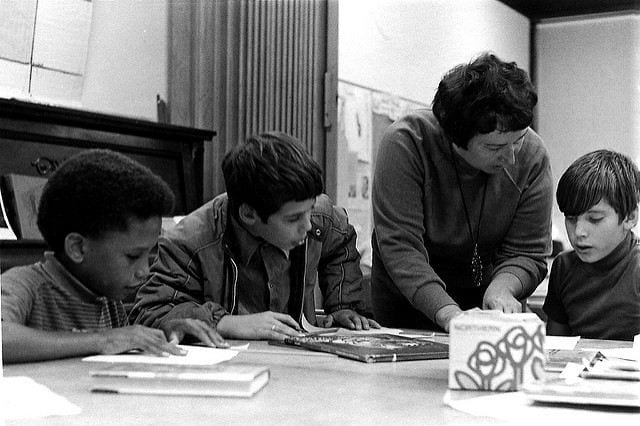
By the summer of 2018, it had been more than 30 years since Maronda Mims had started her college journey. She’d earned credits from North Carolina State University and three different community colleges in New York and New Jersey. Finally, in her 50s, she was about three semesters from graduating from Rutgers University with a degree in environmental science. Then her mother was diagnosed with cancer, and Mims dropped everything to care for her.
Her mother eventually went into remission, and Mims went back to work. Before she could even think about going back to college, the pandemic hit.
Last year, she applied to go back to Rutgers and was accepted but was barred from enrolling. She had a hold on her account, she eventually learned, because of an unpaid $2,000 bill. Unable to pay it back, she gave up, she said: “I just prayed, like if it’s meant for me, please God let it happen.”
Then she got a call from an unknown number. Assuming it was spam, she ignored it. But the caller left a voicemail asking if she wanted to go back to college and offering to help. The next time they called, she picked up.
The caller was from an education company called ReUp Education that, through a partnership with the state of New Jersey, offers one-on-one coaching to adults who left college without graduating.

Since the partnership began in March 2023, at least 8,600 adults assisted by ReUp have reenrolled in college and 350 have graduated, according to the state Office of the Secretary of Higher Education. An estimated 750,000 residents of New Jersey have some credits but never earned a credential, according to that office.
Nationally, there were 36.8 million adults like Mims – under the age of 65 with some college but no credential – as of July 2022, an increase of 2.9 percent or a little more than 1 million people from the previous year, according to the most recent data from the National Student Clearinghouse Research Center. Census data shows that about 26 percent of Americans have only a high school diploma, 36 percent have earned a bachelor’s degree or higher and 10 percent have not finished high school. Adults with some college make up about 28 percent of the American population.
Related: Interested in innovations in higher education? Subscribe to our free biweekly higher education newsletter.
The reasons they haven’t finished are many: They’re working full time; they’re caring for children, aging parents or other family members; they can’t cope with the bureaucratic work needed to reenroll.
“They’ve moved on with their life, they’ve organized it, they’ve filled it up with all sorts of things,” said Terah Crews, ReUp’s CEO. “Most of our learners are, in some way, time-poor.”
As numerous as they are, adults with some college but no credential have no group or organization that represents them, and ReUp is trying to fill that role by working with state leaders and legislators to reengage this population. ReUp also works with the Michigan Association of State Universities, the Ohio Department of Higher Education and Ithaka S+R on another initiative in Ohio that specifically targets students who would benefit from up to $5,000 of debt forgiveness and having their transcripts released. ReUp has also partnered with more than 130 individual colleges across the country, Crews said, and has helped reenroll more than 44,000 students, about half of them in the past two years.
Debt holds back many adults who want to reenroll, even debt lower than $5,000, said Brittany Pearce, a program manager at Ithaka S+R, which runs Ohio’s College Comeback Compact program. “What to many people may not feel like an insurmountable challenge as far as the dollar value of that debt can really feel insurmountable when you’re faced with it,” Pearce said.
Dan Hurley, CEO of the Michigan Association of State Universities, said enrolling students over the age of 25 is critical to meeting the state’s goal of 60 percent of adults having a certificate or a degree by 2030. He said 42 of the top 50 jobs in the state are projected to require at least a bachelor’s degree within the next eight years. Six of Michigan’s 15 public universities are participating in the partnership with ReUp.
Related: For adults returning to college, ‘free’ tuition isn’t enough
To strengthen the New Jersey workforce, leaders felt they needed to create broader awareness of this population and an outreach plan that goes beyond asking each institution to contact students individually, said Stefani Thachik, a senior adviser for the New Jersey Office of the Secretary of Education. The state also has begun offering grants to colleges to develop better support systems for adult students once they return to campus, so they can finish their degrees, which would benefit them and the state’s economy, she said.
It would also help colleges, whose leaders are worried about the declining number of 18-year-olds who will graduate from high school starting in 2025. That falling number comes on top of enrollment declines from the pandemic and difficulties related to last year’s Free Application for Federal Student Aid, said Charles Ansell, vice president for research, policy and advocacy at Complete College America. The nonprofit is working with 20 historically Black colleges and universities and predominantly Black institutions on various efforts to better support adult students, including recruiting and reenrollment efforts.
“You have to retain more students and win back more students and get more students who have never gone to college and are older,” Ansell said. “That’s the only way you’re going to keep your enrollment up.”
But as Mims’ situation shows, it’s not easy to reengage adults who enrolled in college at one point and then dropped out.
Fast forward several years: Mims has been working with Jimmy Wyatt, a senior success coach at ReUp, for about a year. Before that, she had tried to go back to school off and on for years, squeezing the calls and paperwork into the margins of an already very busy life. She was patching together different part-time jobs to pay her bills, while helping care for her mother, niece and nephew.
Related: Proof Points: Lessons from college dropouts who came back
Wyatt doesn’t contact the university on her behalf. But he has helped her navigate the process, figure out why she had this debt (it was complicated) and apply for outside scholarships and grants to enable her to pay it back. He said Mims’ situation has been further complicated by expensive car troubles. She needs her car to go to work; she needs to work to pay back the debt; and, he said, “All these things are so interconnected.”
Together, Wyatt said, they create weekly plans with small tasks so that she’s making efficient progress toward getting back to school. Still, given all the challenges, Wyatt said it sometimes feels like “two steps forward, one step back.”
“Because of him, I’m pushing forward,” Mims said. “He’s giving me the guidance of how to make it happen, or not to fall back.”
That encouragement matters, Crews said, because many adults face mental blocks about returning to college. She said they ask themselves, “What if they don’t accept me?” “What if I’m not good enough?” “What if I organized so much of my life to do this and they still say no?”
They’re often trying to clear financial hurdles, too. Many, like Mims, have debt left over from earlier attempts at college that prevents them from reenrolling. ReUp coaches can help students figure out who to talk to about their institutional debt and can sometimes help them take steps to clear it.
“We advocate on their behalf for policy change at the institutions to make them more accessible and enable more learners to take that step,” Crews said. “We can say, ‘Hey, we’ve got 100 students over here who are ready to sign up, but they have parking tickets. Do you really want to keep them from coming back?’”
In Mims’ case, Wyatt said he has been helping her figure out who at Rutgers to call — various departments have said they do not recognize the source of the debt, but that it does exist.
Related: One university has a new college specifically to re-enroll adults who had dropped out
ReUp says its coaches advocate with institutions to change policies that are holding back students, but they cannot comment on individual cases.
Middlesex College in Edison, New Jersey, hosts evening events, called “Rock ‘n’ ReEnroll,” where prospective students can bring their kids or family members and meet with all the different college employees they need to meet to get enrolled in classes. Since the fall of last year, they’ve hosted four such events and helped more than 100 students reenroll, said Ria Gaviria, the college’s director of academic, career and transfer advising.
Gaviria said that they designed the programs to be fun and engaging but also as efficient as possible, because “time is very precious to this population.”
Although the partnership between ReUp and the state is new, many New Jersey colleges had already been trying to do this work on their own.
At Rowan University in Glassboro, Rory McElwee, vice president of student affairs, has been trying to reach these students for over a decade. Before the university began working with ReUp and received grant funding from the state, the work of reengaging adult students was often done in small batches by McElwee and a few colleagues. She said they would base their outreach on spreadsheets of former students’ names and (often outdated) email addresses.
Now that ReUp is doing the work of reengaging students, McElwee has been able to focus her energy on what these students need to make it to graduation. In addition to offering credit for prior learning, the university used state grant funding to offer “microgrants” to help students pay for non-tuition-related expenses, such as car repairs, child care, textbooks and laptops.
Such grants would have helped Mims who, during her first few years at Rutgers, did not have Wi-Fi at home. She used her smartphone as an internet hot spot, and when it failed, if she didn’t have time to go to the library for internet access, she said she fell behind. She often struggled to pay for textbooks and course materials, she said, and had to borrow them from her classmates.
Despite such challenges, Mims kept pushing herself back toward education. She recalls sitting in unemployment offices and with workforce counselors at various times, considering where she saw herself in the future. Each time, she said, “my main goal in my mind and heart was to get a degree.”
Now, Mims is working her way through the list of scholarship and grant applications that Wyatt sent her. She’s going to try to patch these together to pay off the overdue balance and get the hold cleared, so that she can get back in the classroom.
Close to tears, Mims said, “I’ve just been trying to do this for so long. It’s just been a lot. It’s been really heavy on me. I was so close. I got so close. But yet I feel like it’s still so far.”
Contact staff writer Olivia Sanchez at 212-678-8402 or osanchez@hechingerreport.org.
This story about college completion was produced by The Hechinger Report, a nonprofit, independent news organization focused on inequality and innovation in education. Sign up for the Hechinger higher education newsletter. Listen to our higher education podcast.
The post States want adults to return to college. Many roadblocks stand in the way appeared first on The Hechinger Report.
By the summer of 2018, it had been more than 30 years since Maronda Mims had started her college journey. She’d earned credits from North Carolina State University and three different community colleges in New York and New Jersey. Finally, in her 50s, she was about three semesters from graduating from Rutgers University with a
The post States want adults to return to college. Many roadblocks stand in the way appeared first on The Hechinger Report. Higher Education, News, Adult learning, Career pathways and economic mobility, College to careers, community college, Featured, Higher education affordability, Higher education completion The Hechinger Report








